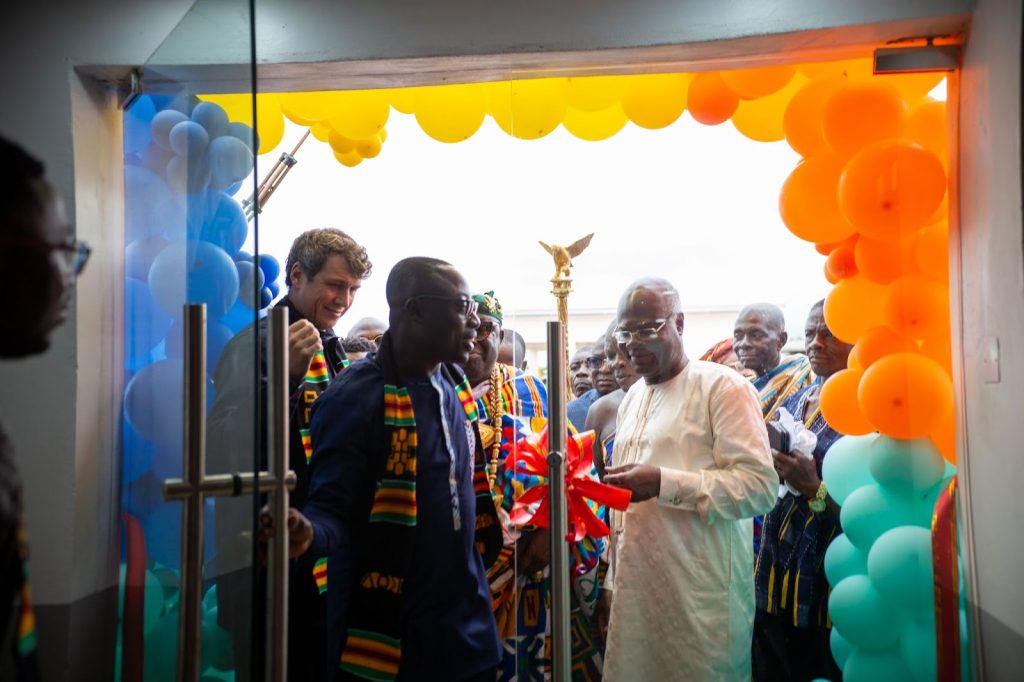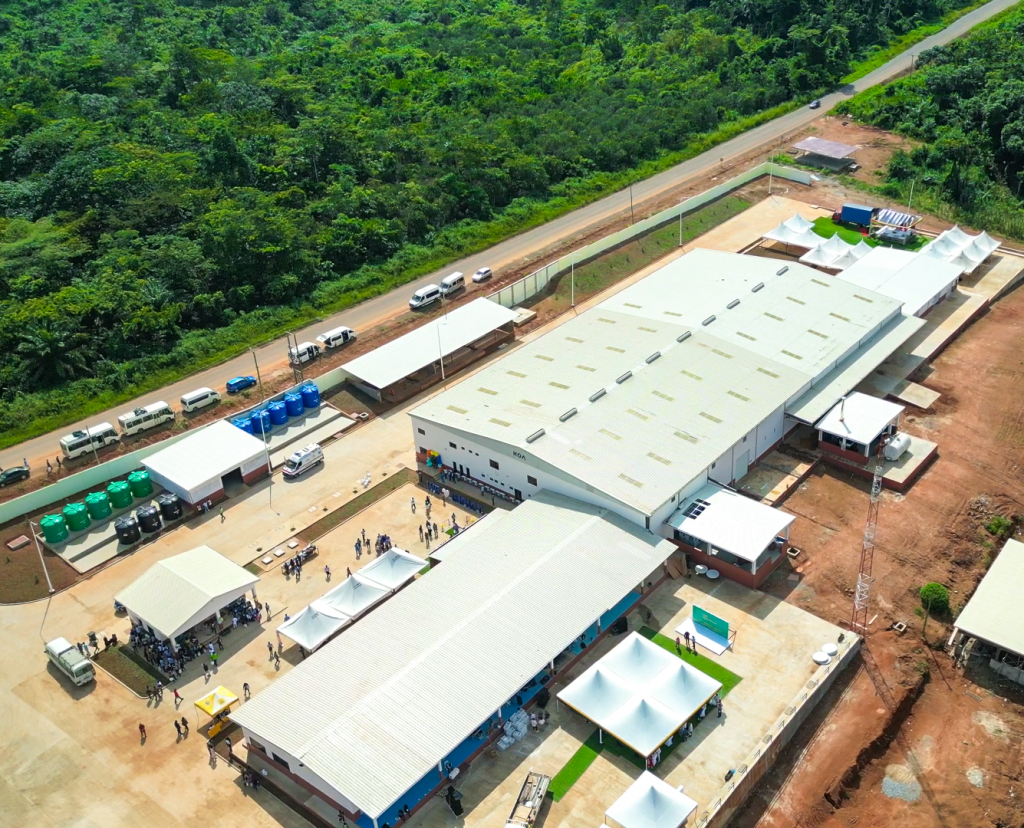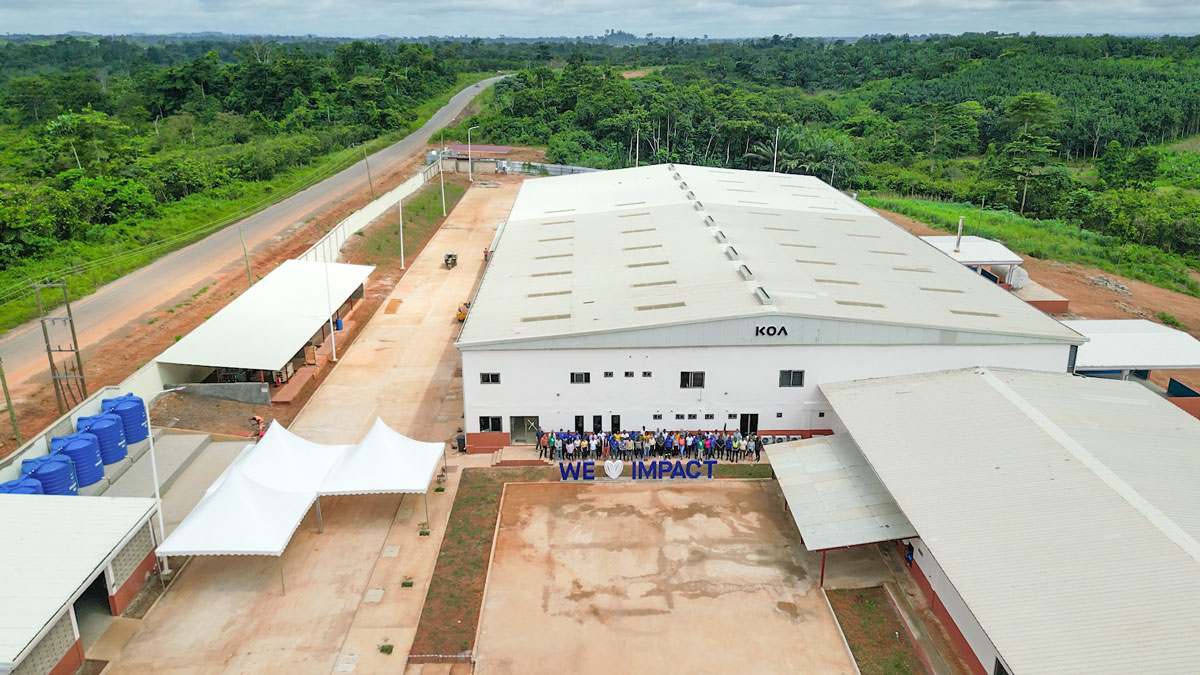On August 25, 2023, Koa celebrated a significant milestone with the inauguration of its state-of-the-art cocoa fruit factory in the heart of Ghana’s cocoa-producing region, Akim Achiase. This event represented a pivotal moment in our partnership with Koa, a forward-thinking Swiss-Ghanaian sustainable cocoa fruit company.
Since May 2022, the Landscape Resilience Fund (LRF) has been working hand-in-hand with Koa, in close collaboration with the IDH Farmfit Fund, to help establish their new solar-powered processing facility in Ghana. Our collective goal was to increase Koa’s cocoa fruit processing capacity by tenfold while at the same time boosting the local economy.

From left to right: Dr. Simone Haeberli (Deputy Head of Mission and Head of Cooperation, Swiss Embassy in Ghana), Kobina Tahiru Hammond (Ghana Minister of Trade & Industry), Daasebre Nana Gyenin Kantan IV (Chief of Akyim Abuakwa), Anian Schreiber (Director of Koa). Source: Koa
Our investment in Koa has already had a positive ripple effect, catalyzing CHF 7.3 million in additional private investments, with an additional CHF 8 million underway, demonstrating the catalytic impact of our support to climate-smart SMEs such as Koa that work closely with smallholder farmers in agro-commodity landscapes.
Through our partnership with Koa, over 3,100 farmers now benefit from increased incomes and knowledge for climate-smart cocoa production. Looking ahead to 2026, we hope to reach 10,000 farmers.

As Ghana is the world’s second-largest cocoa producer, this factory serves as a bridge, connecting Akim Achiase, Ghana, to the global cocoa market. This venture not only enhances the local economy but also creates employment opportunities and fortifies Ghana’s position in the cocoa industry, promising a more diversified economic landscape.
Koa’s dedication to sustainability and environmental responsibility shines through as they have unlocked a new decentralised value chain around the previously unused cocoa pulp. Their new factory will play a crucial role in upcycling this waste and transforming it into fruit juice for export. This circular approach not only curbs waste but promotes a healthier environment and improved livelihoods for smallholder cocoa farmers.

“Koa will be working with about 10,000 farmers at its peak and the factory will employ about 250 workers in and around Achiase. I foresee cocoa farmers adopting good agronomic practices to ensure they have healthy cocoa plants. Since the more pulp you supply to Koa, the higher your returns, these farmers will attend to their farms to increase cocoa productivity.” – Daniel Otu, Koa’s Production and Operations Director and Factory Project Lead
With the factory’s increased production capacity, the incomes of up to 10,000 smallholder cocoa farmers are expected to rise by 30% in the long term. Employment numbers have already tripled and are set to grow further, making a positive impact on the local economy and communities in and around Akim Achiase.
The inauguration of Koa’s cocoa fruit factory demonstrates the impact that investors can derive from investing in innovative climate-smart SMEs, such as Koa, showcasing not only their influence on climate action but also their significant contributions to the social fabric of the local communities.
“The LRF’s mission is to empower climate-smart SMEs through catalytic capital and expand locally driven climate adaptation solutions. While we continuously learn and adapt to local realities on the ground, we are proud to witness tangible benefits of our work with Koa, such as enhanced climate resilience of local communities, adoption of sustainable farming practices and improved livelihoods of smallholder farmers. This work will serve as a blueprint for other bankable climate adaptation solutions that increase the resilience of communities, improve the livelihoods of smallholder farmers and safeguard our environment.” – Aziz Ahmed, LRF’s Landscape Coordinator in Ghana.
The LRF’s landscape approach to building climate resilience unlocks positive benefits for biodiversity and gender equity. Investors and philanthropic funders interested in supporting this work can contact the Landscape Resilience Fund today to find out more.
